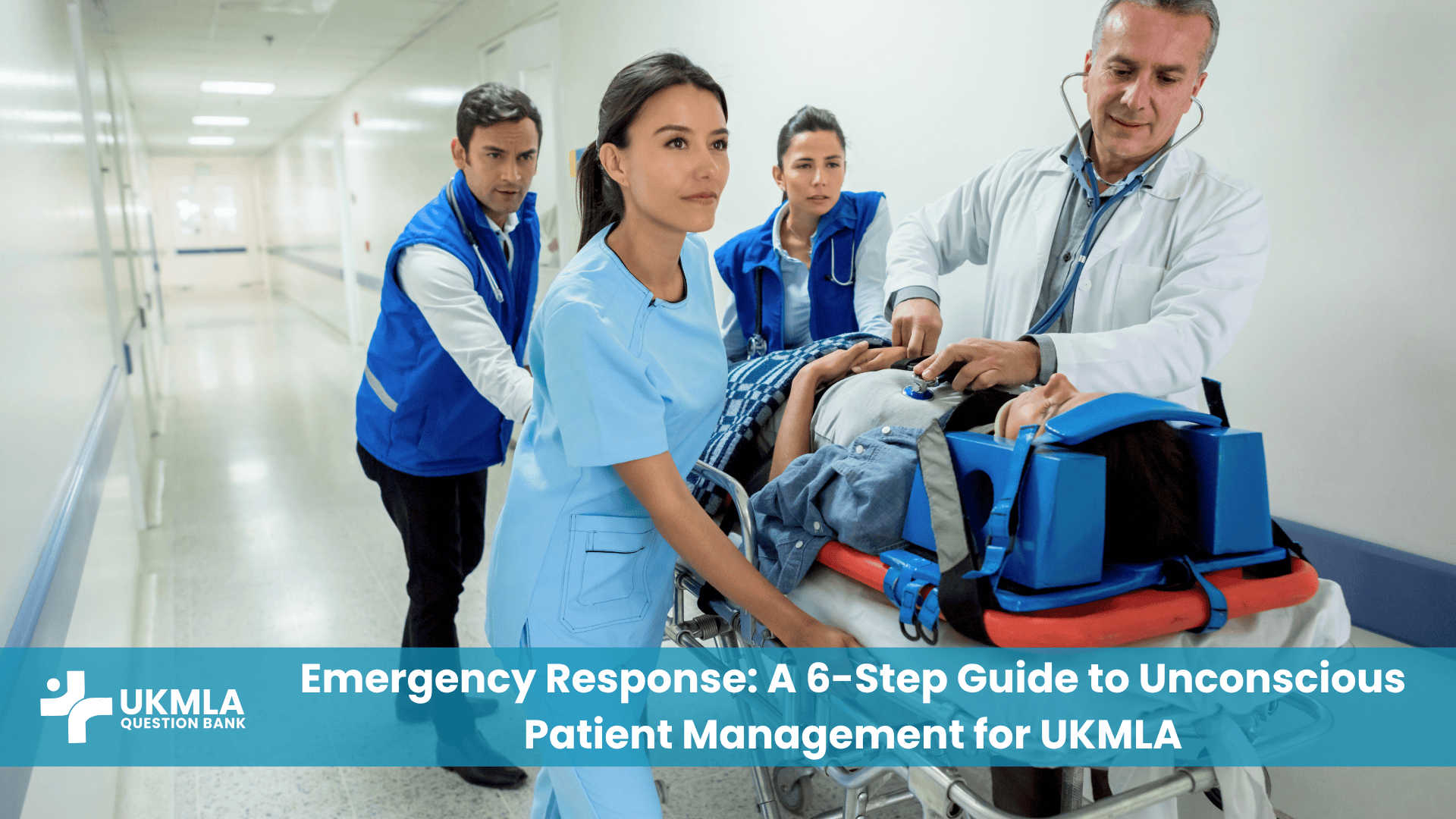Preparing for the United Kingdom Medical Licensing Assessment (UKMLA) is a multifaceted journey. While dedicated UKMLA book study forms the bedrock of your knowledge acquisition, your real-world clinical experience offers an invaluable dimension that can transform your understanding from theoretical to practical. Many candidates wonder how to best merge these two crucial learning streams for their UKMLA preparation. The truth is, the synergy between hands-on patient care and focused textbook learning—key to integrating clinical experience with UKMLA book study—is not just beneficial; it’s essential for mastering the UKMLA and becoming a competent, confident doctor.
This comprehensive guide will explore effective strategies for successfully integrating clinical experience with your UKMLA book study. We’ll delve into how to make your clinical encounters enrich your theoretical knowledge and how to use your UKMLA book study time to make sense of what you observe in practice. By actively integrating clinical experience with UKMLA book study, you’ll not only enhance your UKMLA preparation but also develop the critical clinical problem-solving skills vital for your future medical career. Let’s unlock the power of this integrated approach to help you achieve a high score and excel in your medical journey.
Key Takeaways
Before we dive deeper, here are the essential points for effectively integrating clinical experience with UKMLA book study:
Active Reflection is Key: Don’t just see patients; reflect on their cases in the context of your UKMLA syllabus, a core part of integrating clinical experience with UKMLA book study.
Clinical Questions Drive Study: Use uncertainties or interesting cases from your clinical practice to direct your UKMLA book study.
Contextualize Book Knowledge: Actively try to visualize or recall real patient scenarios when studying theoretical concepts from your UKMLA book study.
Use Resources Wisely: Select UKMLA question banks and study materials that emphasize clinical reasoning and the application needed for integrating clinical experience with UKMLA book study.
Time Management is Crucial: Develop a schedule that allows for both dedicated UKMLA book study and effective learning during clinical rotations.
Embrace the “Why”: Constantly ask why certain investigations are ordered, why specific treatments are chosen, and how this relates to underlying pathophysiology discovered during your UKMLA book study.
Patient Encounters are Learning Gold: Every patient offers a unique opportunity to solidify your understanding of diseases, presentations, and management, enriching your UKMLA clinical experience integration.
The Dichotomy: Book Smarts vs. Street Smarts in Medicine
In medical education, there’s often a perceived divide between “book smarts” – the theoretical knowledge gained from UKMLA book study – and “street smarts” – the practical wisdom acquired through clinical experience. For the UKMLA, success lies in effectively integrating clinical experience with UKMLA book study.
Understanding the Scope of UKMLA Book Study
Your UKMLA book study typically involves a vast array of resources: core medical textbooks, review books, online modules, and, critically, question banks. These materials are designed to cover the breadth of the UKMLA content map, encompassing basic sciences, clinical medicine, ethics, and law. The goal is to build a strong foundational knowledge of disease processes, diagnostic criteria, and management guidelines – all vital components of your UKMLA preparation.
However, purely theoretical study can sometimes feel abstract. It provides the “what” and often the “how,” but the “why” in a real-world patient context can be less clear. This is where integrating your clinical experience for UKMLA becomes vital for a deeper understanding.
The Irreplaceable Value of Clinical Experience for UKMLA Study
Clinical experience – whether from medical school rotations, internships, or other healthcare roles – is where medical knowledge comes alive. You witness the nuances of patient presentations, the impact of comorbidities, the challenges of communication, and the realities of the healthcare system. This practical wisdom is crucial for integrating clinical experience with UKMLA book study. You learn to recognize patterns, develop clinical intuition, and understand the human side of medicine.
Highlight: Clinical experience provides the context that textbooks often cannot fully convey, making abstract concepts tangible and memorable for your UKMLA book study. It’s where you see the “illness script” for various conditions play out in real time, which is invaluable for tackling the scenario-based questions prevalent in the UKMLA. This UKMLA clinical experience integration is key.
Why the UKMLA Demands More Than Rote Memorization
The UKMLA is not merely a test of factual recall; it assesses your ability to apply knowledge in a clinical context, make sound judgments, and demonstrate readiness for safe practice. This is explicitly highlighted in sections of the exam focusing on practical skills and professionalism. You can learn more by reading our article, “A Deep Dive into the ‘Readiness for Safe Practice’ Domain of UKMLA“.
Rote memorization of facts, while necessary to some extent, will not be sufficient to excel. The exam requires you to think critically, solve problems, and make decisions as a competent junior doctor would. Successfully integrating clinical experience with UKMLA book study is the most effective way to develop this applied knowledge and clinical reasoning.
Strategies to Actively Bridge Clinical Experience with UKMLA Book Study
Creating a conscious link between what you see in practice and what you read in books is an active process for successful UKMLA clinical experience integration. It requires deliberate effort and specific techniques to maximize learning from both domains.
The “Patient as a Textbook” Approach for UKMLA Learning
Treat every patient encounter as a learning opportunity that complements your UKMLA book study. When you see a patient, don’t just focus on the immediate task. Think about their condition in the broader context of your studies for integrating clinical experience with UKMLA book study:
What are the classic textbook symptoms, and how do this patient’s symptoms align or differ?
What are the underlying pathophysiological mechanisms at play, as learned in your UKMLA book study?
What are the differential diagnoses, and why were some ruled out?
How does the management plan align with established guidelines you’ve studied?
This approach turns passive observation into active learning, making your clinical hours an extension of your study time and solidifying your UKMLA clinical experience integration.
Reflective Practice: Connecting Cases to Concepts in Your UKMLA Study
After a clinical session or encountering an interesting case, take time for reflective practice. This could involve:
Journaling: Briefly write about a case, noting key findings, your thought process, and any learning points. Connect these to specific topics in your UKMLA syllabus, enhancing how you integrate clinical experience with book study.
Case Discussions: Discuss anonymized cases with peers, supervisors, or mentors. Explaining a case to someone else is a powerful way to consolidate your understanding gained from UKMLA book study and clinical exposure.
Mind Mapping: Create mind maps that link a patient’s presentation to relevant diseases, investigations, and treatments you’ve learned from books.
“Reflection on experience, if it is to lead to learning, must be active, and not passive. It must be a process of thinking, of probing, of analysis, of making connections, and of trying to understand.” – Professor David Boud, Expert in Workplace Learning.
This reflective process helps to cement knowledge and identify gaps that your UKMLA book study can fill, perfecting your method for integrating clinical experience with UKMLA book study.
Using Clinical Questions to Drive Your UKMLA Book Study
Let your clinical experiences guide your UKMLA book study. When you encounter something unfamiliar, a confusing presentation, or a treatment you don’t fully understand during your effort to integrate clinical experience for UKMLA:
Formulate a specific question: Instead of “I don’t understand asthma,” ask “Why was this asthmatic patient, who is on regular inhaled corticosteroids, still experiencing nocturnal symptoms?”
Seek answers in your study materials: Use your textbooks, review articles, and reputable online resources to find evidence-based answers to bolster your UKMLA book study.
Relate it back to the patient: How does this new knowledge apply to the patient you saw?
This “just-in-time” learning is highly effective because it’s driven by a real-world need to know, making the information more relevant and memorable for your UKMLA preparation and the overall goal of integrating clinical experience with UKMLA book study.
Clinical Encounter Example | UKMLA Book Study Link | Learning Outcome for Integrating Clinical Experience & Book Study |
|---|---|---|
Patient with atypical chest pain | Review differential diagnoses of chest pain; ECG interpretation; cardiac enzymes. | Improved diagnostic reasoning for cardiac and non-cardiac causes, aiding UKMLA clinical experience integration. |
Child with a new-onset rash | Study common pediatric exanthems; red flag signs in febrile children. | Better recognition of common vs. serious rashes, enhancing UKMLA book study. |
Elderly patient with confusion | Read about delirium vs. dementia; common causes of acute confusion in the elderly. | Enhanced ability to assess and manage confusion, vital for integrating clinical experience with UKMLA book study. |
Leveraging UKMLA Study Resources to Reinforce Clinical Learning
Your chosen study resources, particularly question banks, can be powerful tools for simulating clinical decision-making and reinforcing the lessons learned from real patient encounters as you work on integrating clinical experience with UKMLA book study.
Choosing UKMLA Question Banks that Mirror Real-Life Scenarios
Not all question banks are created equal. When selecting a UKMLA question bank to help integrate clinical experience for UKMLA, look for one that:
Features detailed clinical vignettes similar to what you encounter in practice.
Tests application of knowledge rather than just recall of isolated facts.
Provides thorough explanations that link back to underlying principles and clinical guidelines essential for UKMLA book study.
Covers a wide range of common and important clinical presentations.
A well-designed question bank acts as a bridge, helping you practice applying your book knowledge to scenarios that mimic real patient interactions. For guidance on this, check out our article “How to Use a UKMLA Question Bank Effectively“. This is a key strategy for effectively integrating clinical experience with UKMLA book study.
Deconstructing Clinical Vignettes: Identifying Patterns and Applying Knowledge from Book Study
When working through practice questions, especially those with clinical scenarios:
Identify key information: What are the most important positive and negative findings in the vignette?
Formulate a differential diagnosis: Based on the initial information from your UKMLA book study, what conditions are possible?
Predict the next steps: What investigations would you order, or what initial management would you consider based on your clinical understanding?
Compare with the options: How does your reasoning align with the provided answer choices?
This systematic approach to deconstructing vignettes helps you hone the clinical problem-solving skills tested in the UKMLA and mirrors the diagnostic process in actual practice, a testament to successful UKMLA clinical experience integration.
Mock Exams: Simulating the Pressure of Clinical Decision-Making for the UKMLA
Full-length UKMLA mock exams do more than just test your knowledge; they simulate the time pressure and cognitive load of making numerous clinical decisions consecutively. This is akin to a busy on-call shift where you must rapidly assess and manage multiple patients, perfectly integrating clinical experience with UKMLA book study under pressure.
Highlight: Regularly undertaking timed mock exams helps build your mental stamina and decision-making efficiency under pressure, crucial skills for both the UKMLA and real-world practice that come from good UKMLA clinical experience integration. Analyzing your performance on mocks can also reveal areas where your integration of clinical knowledge and UKMLA book study needs further refinement.
Practical Tips for Integrating Study and Practice During Rotations/Placements
Your clinical rotations are prime opportunities for effectively integrating clinical experience with UKMLA book study. Here’s how to make the most of them:
Pre-Rotation Prep: Aligning UKMLA Book Study with Upcoming Clinical Exposure
Before starting a new rotation (e.g., cardiology, pediatrics), dedicate some UKMLA book study time to the core topics and common conditions you’re likely to encounter. Review the relevant sections in your textbooks and UKMLA study guides.
Familiarize yourself with common presentations, key investigations, and standard management protocols.
This pre-reading provides a framework, making it easier to understand and learn from the cases you see, facilitating the integration of clinical experience for UKMLA.
This proactive approach means you hit the ground running, able to ask more informed questions and make stronger connections between theory and practice from day one of your placement.
On-the-Go Learning: Quick Reviews and Note-Taking During Clinical Duties for UKMLA Integration
Clinical environments are often busy, but you can still find moments for learning and integrating clinical experience with UKMLA book study:
Carry a small notebook or use a notes app: Jot down interesting findings, unfamiliar terms, or questions that arise.
Use medical apps: Quick reference apps for drug formularies, clinical scores, or guidelines can be useful (when appropriate and permitted) to supplement your UKMLA book study.
Brief discussions: If time allows, ask seniors or peers quick questions about cases.
Even short bursts of focused learning during your clinical duties can reinforce concepts and highlight areas for later, more in-depth UKMLA book study.
Post-Rotation Consolidation: Solidifying Knowledge with Focused UKMLA Revision
After each clinical day or at the end of a rotation, dedicate time to consolidate what you’ve learned, further integrating clinical experience with UKMLA book study.
Review your notes from the day.
Read up on the conditions you encountered, focusing on aspects that were unclear or particularly interesting using your UKMLA book study materials.
Do practice questions related to the topics you saw in practice.
This post-rotation review helps to solidify the learning, ensuring that the practical experience translates into a deeper, more integrated understanding for your UKMLA preparation.
Integration Phase | Activity Example | Benefit for Integrating Clinical Experience & UKMLA Book Study |
|---|---|---|
Pre-Rotation | Review common conditions for the upcoming specialty using UKMLA book study resources. | Faster understanding of cases, more targeted learning for UKMLA clinical experience integration. |
During Rotation | Note down 2-3 learning points/questions per day related to clinical observations. | Captures real-time queries for later focused UKMLA book study. |
Post-Rotation | Read in-depth about 1-2 interesting cases seen weekly, cross-referencing with UKMLA book study. | Deepens knowledge of specific conditions and their nuances, solidifying UKMLA clinical experience integration. |
Overcoming Challenges in Integrating Clinical Experience and Book Study for UKMLA
While the benefits are clear, effectively integrating clinical experience with UKMLA book study comes with its challenges. Recognizing and addressing these can make the process smoother.
Time Management: Balancing Clinical Duties with Dedicated UKMLA Study Hours
One of the biggest hurdles is finding enough time. Clinical duties can be long and demanding, leaving little energy for UKMLA book study.
Create a realistic schedule: Allocate specific, protected times for studying and integrating your clinical learning.
Utilize “dead time”: Commutes (if not driving), lunch breaks, or waiting periods can be used for quick reviews or practice questions related to your UKMLA book study.
Be flexible but disciplined: Some days will be tougher than others. Adjust your schedule as needed but try to maintain overall consistency in your efforts to integrate clinical experience for UKMLA.
Our article “How Many Hours Should You Study for the UKMLA? A Realistic Approach” offers further insights into effective time management for your UKMLA preparation.
Dealing with “Zebras”: When Clinical Cases Don’t Fit the Textbook Descriptions for UKMLA
In clinical practice, you’ll encounter patients whose presentations don’t neatly fit textbook descriptions – the “zebras” among the “horses.” This can be confusing when trying to reconcile experience with UKMLA book study.
Focus on common conditions first: Your UKMLA preparation should prioritize common and important conditions.
Use atypical cases as learning opportunities: Discuss these with senior colleagues to understand the diagnostic reasoning, adding depth to your UKMLA clinical experience integration.
Recognize that textbooks provide models: Real-life medicine has more variability. The UKMLA will primarily test your understanding of typical presentations and established guidelines from your UKMLA book study.
Don’t let rare or complex cases derail your core study, but do use them to appreciate the breadth of medicine.
Avoiding Burnout: Maintaining Enthusiasm for Both Learning Modalities in UKMLA Prep
Juggling clinical responsibilities and intensive study for the UKMLA can lead to burnout. It’s crucial to maintain your well-being and enthusiasm for integrating clinical experience with UKMLA book study.
Celebrate small wins: Acknowledge your progress in both clinical skills and study.
Maintain interests outside medicine: Hobbies and social connections are vital for balance.
Remember your “why”: Keep your long-term career goals in mind to stay motivated during your UKMLA preparation.
Seek support: Talk to peers, mentors, or family if you’re feeling overwhelmed.
Highlight: A sustainable approach to integrating clinical experience and UKMLA book study involves prioritizing well-being to prevent burnout and maintain long-term learning effectiveness. This is key for successful UKMLA clinical experience integration.
Frequently Asked Questions (FAQs) on Integrating Clinical and Book Study Answered
As soon as you begin having meaningful patient contact. Even early clinical exposures can provide context for your foundational UKMLA book study. The key is to make integrating clinical experience with UKMLA book study a continuous habit throughout medical school and beyond.
This is common. Textbooks often describe classic presentations. Use these discrepancies as learning points for integrating clinical experience with UKMLA book study. Discuss with seniors why a patient presented atypically. For the UKMLA, focus on understanding typical presentations first, as these are most commonly tested.
Focus on anonymized key learning points: diagnosis, key investigations, management principles, and any “red flags.” Briefly link these to relevant UKMLA syllabus topics or textbook chapters from your UKMLA book study for easy cross-referencing and to better integrate clinical experience for UKMLA.
Both have benefits for integrating clinical experience with UKMLA book study. Pre-reading provides a framework. Post-encounter study consolidates learning and clarifies uncertainties. A combination is ideal: a general overview before, and focused UKMLA book study after specific cases.
Treat each MCQ vignette as a mini-case. Actively work through your diagnostic and management thought process before looking at the options. Analyze the explanations thoroughly to understand the optimal clinical reasoning. Our article “Why UKMLA MCQs Are Crucial For Your Medical Career Success” elaborates on how this aids in integrating clinical experience with UKMLA book study.
Focus on understanding the underlying principles rather than memorizing every detail of every case. Use anonymized case summaries or reflective notes to capture the core learning points that relate to your UKMLA curriculum and help in integrating clinical experience with UKMLA book study.
Absolutely. Teaching or explaining a concept or case to someone else is a powerful way to solidify your own understanding gained from UKMLA book study and clinical work, and identify gaps. Peer discussions can bring different perspectives and reinforce learning, vital for UKMLA clinical experience integration.
For the UKMLA, you are generally expected to know the “gold standard” or guideline-based management from your UKMLA book study. However, understanding the principles behind these guidelines will help you adapt to real-world scenarios later. Be aware of resource limitations but focus your study on best practices for integrating clinical experience with UKMLA book study.
For UKMLA preparation and effectively integrating clinical experience with UKMLA book study, prioritize common and important conditions. While rare cases are interesting, the exam will predominantly cover what a safe and competent junior doctor is expected to manage. Use interesting cases for broader learning but ensure your core UKMLA topics are covered thoroughly.
Always try to link your reflections back to the GMC’s UKMLA content map or your study guide’s syllabus. Ask yourself: “How does this case illustrate a key concept I need to know for the exam from my UKMLA book study?” This keeps your reflections relevant and high-yield for integrating clinical experience with UKMLA book study.
Conclusion: Forging a Stronger Path to UKMLA Success by Integrating Clinical Experience and Book Study
Successfully integrating your clinical experience with dedicated UKMLA book study is not just an exam tactic; it’s a fundamental approach to becoming a more insightful and effective physician. This synergy allows you to transform abstract knowledge into applicable skills, fostering the deep understanding and clinical reasoning能力 (nénglì – ability) that the UKMLA aims to assess. By actively reflecting on patient encounters, using clinical questions to drive your learning from UKMLA book study, and leveraging resources that mirror real-world medicine, you build a robust foundation for both exam success and your future practice. The effective integration of clinical experience for UKMLA is paramount.
The journey requires discipline, effective time management, and a commitment to continuous learning from every available source. Embrace the dynamic interplay between theory and practice, and you’ll find your UKMLA preparation for integrating clinical experience with UKMLA book study becomes more engaging, relevant, and ultimately, more successful. Your future patients will benefit from the well-rounded, clinically astute doctor you are striving to become.
Ready to bridge the gap between your clinical experience and UKMLA book study? Explore resources designed to enhance your clinical reasoning and exam performance. Start integrating effectively today! Consider visiting UKMLAQuestionBank.com for specialized tools and question banks that can aid your journey.




